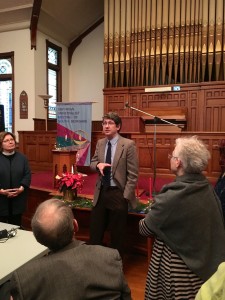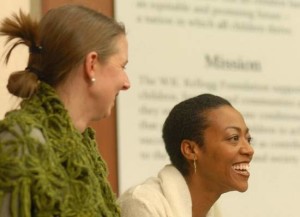Faith-Based Programs
“If you remove the yoke from among you, the pointing of the finger, the speaking of evil … your ancient ruins shall be rebuilt; you shall raise up the foundations of many generations; you shall be called the repairer of the breach ….”
— Isaiah 58: 10-12
Congregations are fertile ground for open-hearted dialogue and encouraging action around racial justice and reconciliation. Unfortunately, Sunday morning remains the most segregated time of the week. Traces of the Trade has a strong religious dimension, and we seek to inspire people of faith to take further steps on their journeys towards racial healing.
 We offer our film, discussion guides and resource materials, and run programs, as well as providing speakers and facilitators. We work with national denominations, regional conferences and dioceses, and individual congregations to explore church histories and address the many legacies of slavery today.
We offer our film, discussion guides and resource materials, and run programs, as well as providing speakers and facilitators. We work with national denominations, regional conferences and dioceses, and individual congregations to explore church histories and address the many legacies of slavery today.
Our faith-based programs can also include the use of our companion video, Repairing the Breach: The Episcopal Church and Slavery Atonement, featuring former Presiding Bishop Frank T. Griswold.
“I cried during the film, laughed with Bill’s humor and listened to Holly’s searing story of engaging her family’s past. … I was so inspired by this film’s provocative, though loving ideas… YOU MUST have them talk to your congregation.”
— Pastor Judy Hanlon, Hadwen Park Congregational Church (Worcester, Mass.)
PROGRAM OPTIONS:

- Film screenings, facilitated dialogues, and anti-racism programs for parishes, regional and national entities
- Guest preachers
- Professional development workshops for clergy, staff, and lay leaders to build awareness of issues of race and privilege, or as training to conduct such programs
- Exploring historical ties to slavery through workshops and consultations
Our programs feature producer/director Katrina Browne, executive director James DeWolf Perry, other DeWolf family members from the film, and trained Tracing Center speakers and facilitators.
DENOMINATIONS RESPOND:
Episcopal Church
The Episcopal Church has “enthusiastically” endorsed Traces of the Trade and the programming offered with it, especially the facilitation of family members Constance and Dain Perry, through the Executive Council’s Anti-Racism Committee, the Presiding Bishop, and the President of the House of Deputies.
 Screenings of Traces of the Trade at General Convention, and testimony from those in the film, contributed to the adoption of Resolutions A-123 (2006) and A-143 (2009) on slavery and reconciliation, and the film has been singled out as a “significant means” for dioceses and parishes to respond to these resolutions.
Screenings of Traces of the Trade at General Convention, and testimony from those in the film, contributed to the adoption of Resolutions A-123 (2006) and A-143 (2009) on slavery and reconciliation, and the film has been singled out as a “significant means” for dioceses and parishes to respond to these resolutions.
“We really must, as Episcopalians, [ask] ‘How are we complicit?’ and ‘What does that complicity mean?’ My own concern is … to acknowledge this reality and look at our own history and say, ‘I’m sorry.’”
“For me, this is not abstraction. It’s so much about people and how they’ve been hurt, and how they continue in a variety of ways to be hurt.”
— Former Presiding Bishop Frank T. Griswold, Episcopal Church of the United States, in our “Repairing the Breach: The Episcopal Church and Slavery Atonement”
United Church of Christ
The United Church of Christ recommends the use of Traces of the Trade, and facilitated dialogues based on it, as “an important resource” in their “Sacred Conversations on Race.”
The Massachusetts Conference calls the film “an excellent tool” and recommends our programs and especially the facilitation of Holly Fulton and Bill Peebles.
Unitarian Universalist Association
 The Unitarian Universalist Association calls Traces of the Trade “ground-breaking … a real opportunity for spiritual growth and change.”
The Unitarian Universalist Association calls Traces of the Trade “ground-breaking … a real opportunity for spiritual growth and change.”
The UUA has partnered with us to develop companion materials, saying that the film “speaks powerfully to the spiritual challenge of what it means to be a white person dealing with race and privilege in the United States.”
“But now in Christ Jesus you who were once far off have been brought near by the blood of Christ. For he is our peace; in his flesh he has made both groups into one and has broken down the dividing wall, that is, the hostility between us.”
— Ephesians 2: 13-14


